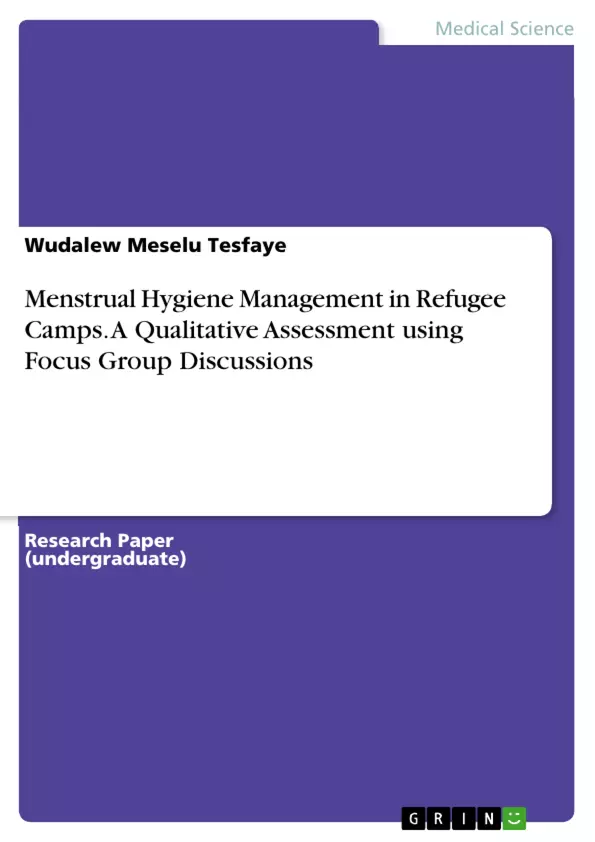Menstrual hygiene is a subject that has thus far been largely neglected by public health literature, including the WASH sector (water, sanitation, and hygyiene). As a result, millions of women and girls continue to be denied their rights for WASH, health, education, dignity and gender equity.
This study uses a Focus Group Discussion in order to identify the access to menstrual hygiene management (MHM) materials; challenges and the utilization behaviors of refugees and to assess their preference for type of MHM materials.
Key findings: Different experiences of sanitary pads utilization were observed among the discussants before their arrival to the camp. Those women coming from an urban area had experience with sanitary pads utilization, while those women coming from rural parts of Somalia used to use cloths.
Conclusion: As the High Commissioner’s Five Commitments to Refugee Women include the provision of sanitary materials to all women and girls of concern, it will be good if the WASH sector and other partners give more attention (besides UNHCR’s concern) to address the women’s demand for MHM items. The disposable type of sanitary pads was the preferred MHM item.
Recommendation: It is recommendable to connect school’s latrines with water for the better management of girls’ menstrual hygiene.
Inhaltsverzeichnis (Table of Contents)
- Introduction
- Objective of the FGD
- Methodology
- Study Period
- Study area
- Study population/Discussants
- Key Findings of the FGD
- Results of the FGD
- Conclusion and recommendations
- Annex I
- Annex.II-Questionnaire
Zielsetzung und Themenschwerpunkte (Objectives and Key Themes)
This study examines the management of menstrual hygiene among women residing in the Bokolmanyo Refugee Camp. Through focus group discussions, the research explores the experiences, practices, preferences, and challenges related to menstrual hygiene management (MHM) among women and school girls in the camp. The study aims to identify the availability and access to MHM materials, understand utilization behaviors, and assess preferences for different types of sanitary products.
- Experiences and practices of menstrual hygiene management before and after arriving at the camp
- Access to and availability of MHM materials in the camp
- Preferences for different types of sanitary pads
- Challenges faced by women in managing their menstrual hygiene
- Awareness of menstrual hygiene among school girls
Zusammenfassung der Kapitel (Chapter Summaries)
The introduction sets the context for the study, highlighting the neglect of menstrual hygiene in WASH and reproductive health sectors, resulting in limited access to essential resources for women and girls. The study focuses on the experiences of refugees in Bokolmanyo camp and aims to identify their needs and preferences regarding MHM materials.
The objectives of the focus group discussions are outlined, including assessing women's previous experiences with MHM, their current practices, preferences for sanitary pad types, challenges faced in accessing MHM materials, and awareness of menstrual hygiene among school girls. The methodology section details the study period, area, and participant selection process.
The key findings of the FGD highlight the varied experiences of discussants in using sanitary pads, with those from urban areas having prior experience compared to those from rural Somalia. Both reusable clothes and sanitary pads are commonly used. There is a strong demand for MHM materials, as the discussants express difficulty in accessing them. The disposable type sanitary pad is preferred by the majority, citing concerns about the health costs associated with reusable pads.
Schlüsselwörter (Keywords)
Menstrual hygiene management, refugee women, Bokolmanyo camp, sanitary pads, access to materials, utilization behaviors, preferences, challenges, awareness, focus group discussions, WASH, sexual and reproductive health.
Frequently Asked Questions
What is the focus of the MHM study in refugee camps?
The study assesses the access to and preferences for menstrual hygiene management (MHM) materials among women in the Bokolmanyo Refugee Camp.
What type of sanitary products do refugee women prefer?
The majority of women expressed a preference for disposable sanitary pads over reusable ones.
What are the main challenges for MHM in camps?
Key challenges include limited access to materials, lack of water in school latrines, and differences in prior experience with sanitary products.
How do previous backgrounds affect MHM practices?
Women from urban areas were generally familiar with sanitary pads, while those from rural areas often used traditional cloths.
What are the recommendations of this study?
Recommendations include connecting school latrines to water sources and increasing the involvement of the WASH sector in MHM provision.
- Quote paper
- Wudalew Meselu Tesfaye (Author), 2015, Menstrual Hygiene Management in Refugee Camps. A Qualitative Assessment using Focus Group Discussions, Munich, GRIN Verlag, https://www.hausarbeiten.de/document/366971


